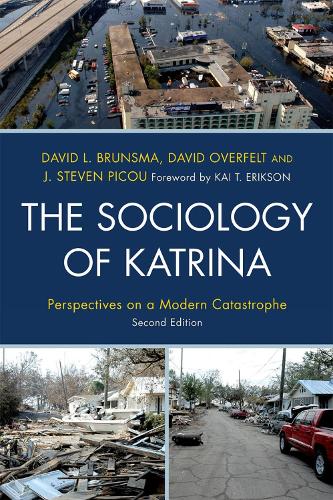
The Sociology of Katrina: Perspectives on a Modern Catastrophe
(Paperback, Second Edition)
Publishing Details
The Sociology of Katrina: Perspectives on a Modern Catastrophe
By (Author) David L. Brunsma
Edited by David Overfelt
Edited by Steven J. Picou
Contributions by Carl L. Bankston
Contributions by John Barnshaw
Contributions by Christine Bevc
Contributions by George E. Capowich
Contributions by Lee Clarke
Contributions by Shyamal K. Das
Contributions by Katharine M. Donato
Bloomsbury Publishing PLC
Rowman & Littlefield Publishers
16th September 2010
Second Edition
United States
Classifications
Tertiary Education
Non Fiction
Aid and relief programmes
363.349220976335
Physical Properties
Paperback
390
Width 156mm, Height 231mm, Spine 20mm
531g
Description
The second edition of The Sociology of Katrina brings together the nation's top sociological researchers in an effort to deepen our understanding of the modern catastrophe that is Hurricane Katrina. Five years after the storm, its profound impact continues to be felt.
This new edition explores emerging themes, as well as ongoing issues that continue to besiege survivors. The book has been updated and revised throughoutfrom data about recovery efforts and environmental conditions, to discussions of major social issues in education, health care, the economy, and crime. The authors thoroughly review the important topic of recovery, both in New Orleans and in the wider area of the Mississippi Gulf Coast. This new edition features a new chapter focused on the Katrina experience for people in the primary impact area, or "ground zero," five years after the storm. This chapter uncovers many challenges in overcoming the critical problems caused by the storm of the century.
From this important update of the acclaimed first edition, it is apparent that "the storm is not over," as Katrina continues to generate political, economic, community, and personal controversy.
Reviews
This second edition constitutes further in depth learning from the most destructive collision in American history between nature's hazard and socially constructed vulnerability, knowledge that is essential as societies head toward more confrontations. -- Raymond Murphy, President, Environment and Society Research Committee of the International Sociological Association; emeritus professor of sociology
From so many vantage points come clear and well formulated descriptions and analyses of Katrina and the consequences many of them dire of this unnatural event. Anyone who wants to know about Katrina, or indeed disaster of any sort, needs to read this important and authoritative book. -- Harvey Molotch, New York University
The 'natural' disaster of Hurricane Katrina was also a major sociological event. Issues of who suffered most, the way damage was assessed, how response organized and the nature of the rebuilding effort were all shaped by social factors. This book gives an important overview, addressing concerns from the role of race and class in shaping impact to the role of religion in shaping response. It will be useful to students and researchers and should be read widely as Americans try to learn from the Katrina catastrophe. -- Craig Calhoun, Professor of Social Sciences, Arizona State University, USA
Praise for the first edition:
This book brings together the nation's top sociological researchers in an effort to catalogue the modern catastrophe that is Katrina. Included are discussions of sociological perspectives of disaster literature, alternative views and analyses of early post-storm data collection efforts, and emerging social questions that have surfaced in the aftermath of Katrina. All royalties from the sale of this book go to the Disaster Relief Fund of the Southern Sociological Society.
The book is a collection of papers presented at the 2006 Southern Sociological Society meeting in New Orleans, updated with new chapters added for this second edition in 2010. * Solidarity *
Author Bio
David L. Brunsma is associate professor of sociology at the University of Missouri at Columbia.
David Overfelt is a graduate of sociology at the University of Missouri at Columbia and a member of Sociologists Without Borders.
J. Steven Picou is professor of sociology and chair of the Department of Sociology, Anthropology, and Social Work at the University of South Alabama in Mobile.
